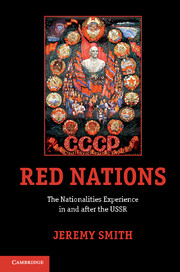Book contents
- Frontmatter
- Dedication
- Contents
- Tables
- Preface
- 1 Introduction: the prison-house of nations
- 2 Dispersal and reunion: revolution and civil war in the borderlands
- 3 Bolshevik nationality policies and the formation of the USSR: the Bolsheviks dispute national policy
- 4 Nation-building the Soviet way
- 5 Surviving the Stalinist onslaught, 1928–1941
- 6 The Great Patriotic War and after
- 7 Deportations
- 8 Territorial expansion and the Baltic exception
- 9 Destalinisation and the revival of the republics
- 10 Stability and national development: the Brezhnev years, 1964–1982
- 11 From reform to dissolution, 1982–1991
- 12 Nation-making in the post-Soviet states
- 13 The orphans of the Soviet Union: Chechnya, Nagorno Karabakh, Abkhazia, South Ossetia and Transdniester
- Conclusion
- Bibliography
- Index
- References
9 - Destalinisation and the revival of the republics
Published online by Cambridge University Press: 05 June 2014
- Frontmatter
- Dedication
- Contents
- Tables
- Preface
- 1 Introduction: the prison-house of nations
- 2 Dispersal and reunion: revolution and civil war in the borderlands
- 3 Bolshevik nationality policies and the formation of the USSR: the Bolsheviks dispute national policy
- 4 Nation-building the Soviet way
- 5 Surviving the Stalinist onslaught, 1928–1941
- 6 The Great Patriotic War and after
- 7 Deportations
- 8 Territorial expansion and the Baltic exception
- 9 Destalinisation and the revival of the republics
- 10 Stability and national development: the Brezhnev years, 1964–1982
- 11 From reform to dissolution, 1982–1991
- 12 Nation-making in the post-Soviet states
- 13 The orphans of the Soviet Union: Chechnya, Nagorno Karabakh, Abkhazia, South Ossetia and Transdniester
- Conclusion
- Bibliography
- Index
- References
Summary
Stalin’s death on 5 March 1953 meant far more than just a change of face at the top of the Soviet system. The frustrated hopes that had arisen after victory over fascism in the Great Patriotic War now came to the fore again. The political uncertainty that followed the unprecedented death of a Soviet tyrant encouraged different interests in Soviet society to trade support for individual leaders and the institutions they headed in return for policies that favoured their interests. As politics consolidated around the CPSU its leader, Nikita Khrushchev, pursued a utopian programme of reforms which aimed at improving the life circumstances of Soviet citizens, not only in a material sense but also in terms of rights, political participation and justice. Participation was to be on terms dictated by the centre, and fell well short of genuine democracy, and Khrushchev encountered many unintended consequences of his policies, particularly after the relative openness signalled by his Secret Speech of February 1956. Throughout his tenure of the post of First Secretary of the CPSU, Khrushchev played a risky game of alternating between favouring, reining in and putting down various interests, a tactic which ultimately left him with no support when a concerted effort to remove him from office was made in 1964. Thus the nationalities experience of the mid to late 1950s and the early 1960s consisted of a series of episodes of mobilisation (either spontaneous or state-led), and inconsistent policies from the centre which at times increased, and at times diminished, the ability of the Soviet republics to deal with their own affairs. Faced with this inconsistency and the unpredictability of national responses, efforts to promote an ideology of the ‘merger of nations’ failed to have any real impact or to inspire new attitudes.
- Type
- Chapter
- Information
- Red NationsThe Nationalities Experience in and after the USSR, pp. 189 - 215Publisher: Cambridge University PressPrint publication year: 2013



